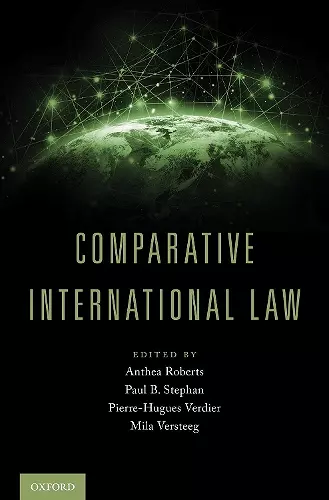Comparative International Law
Paul B Stephan editor Mila Versteeg editor Anthea Roberts editor Pierre-Hugues Verdier editor
Format:Hardback
Publisher:Oxford University Press Inc
Published:22nd Feb '18
Currently unavailable, and unfortunately no date known when it will be back

By definition, international law, once agreed upon and consented to, applies to all parties equally. It is perhaps the one area of law where cross-country comparison seems inappropriate, because all parties are governed by the same rules. However, as this book explains, states sometimes adhere to similar, and at other times, adopt different interpretations of the same international norms and standards. International legal rules are not a monolithic whole, but are the basis for ongoing contestation in which states set forth competing interpretations. International norms are interpreted and redefined by national executives, legislatures, and judiciaries. These varying and evolving interpretations can, in turn, change and impact the international rules themselves. These similarities and differences make for an important, but thus far, largely unexamined object of comparison. This is the premise for this book, and for what the editors call "comparative international law." This book achieves three objectives. The first is to show that international law is not a monolith. The second is to map the cross-country similarities and differences in international legal norms in different fields of international law, as well as their application and interpretation with regards to geographic differences. The third is to make a first and preliminary attempt to explain these differences. It is organized into three broad thematic sections, exploring: conceptual matters, domestic institutions and comparative international law, and comparing approaches across issue-areas. The chapters are authored by contributors who include leading international law and comparative law scholars with diverse backgrounds, experience, and perspectives.
This well-structured volume assembles an impressive roster of contributions to the intriguing new field of comparative international law. * Judge Joan Donoghue, International Court of Justice *
To meet the challenge of a universally recognized rule of law, one needs to understand how and why nations and regions approach international law in different ways. This refreshing collection of essays on comparative international law examines what is vaguely perceived to be true but not acknowledged: that there are major variations in state practice when giving effect to international obligations. * Gillian Triggs, Emeritus Professor, Sydney Law School, and former President, Australian Human Rights Commission *
This publication is an important step in the development of comparative international law and it is likely to be highly influential in both the study and the practice of the law. * Lord Lloyd Jones, Supreme Court of the United Kingdom *
This volume is indispensable to anyone interested in studying why approaches to international law often vary around the world. * Curtis A. Bradley, William Van Alstyne Professor, Duke Law School *
This wide-ranging volume firmly establishes comparative international law as a rich field of study... A refreshing and sophisticated response to theories that advocate hierachy in the name of an international rule of law. * Eyal Benvenisti, Whewell Professor of International Law, University of Cambridge *
The book ... is produced to the excellent and attractive standard of OUP at, these days, a favorable price. * William E. Butler, Journal of Comparative Law *
ISBN: 9780190697570
Dimensions: 239mm x 163mm x 46mm
Weight: 1098g
636 pages